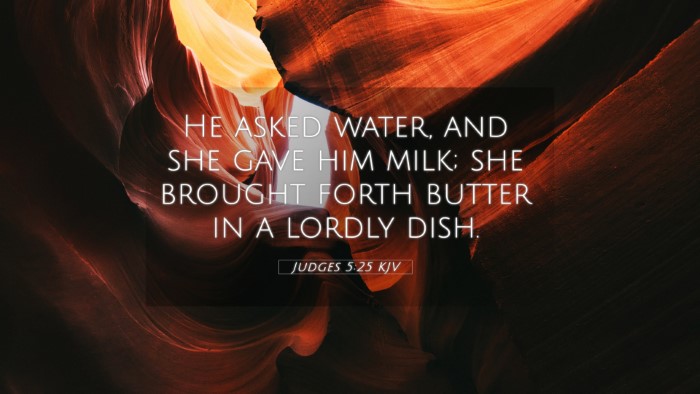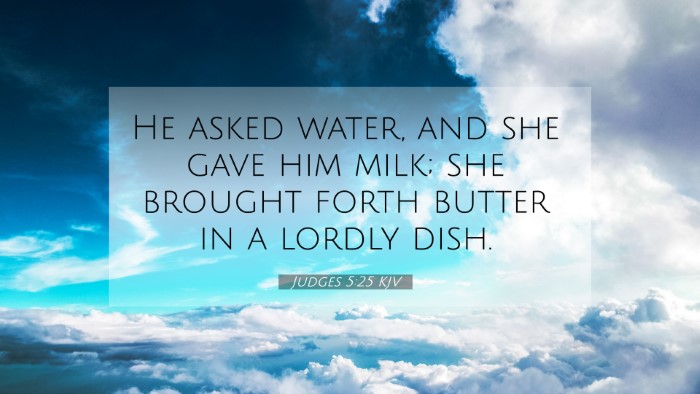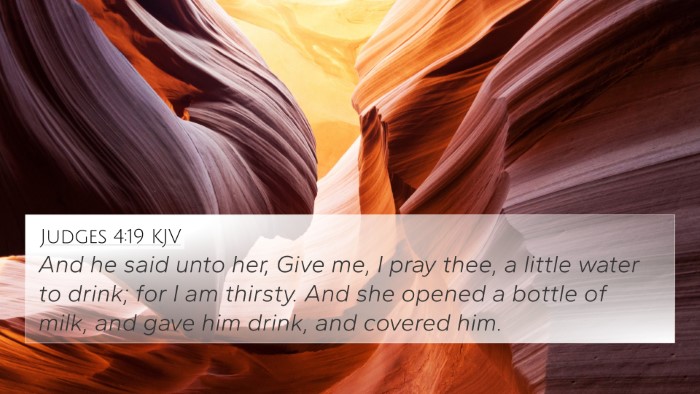Understanding Judges 5:25
The verse Judges 5:25 states:
"He asked water, and she gave him milk; she brought forth butter in a lordly dish."
Summary of Verse Meaning
This verse, situated within the context of Deborah's song of victory, highlights the hospitality and generosity of Jael, the wife of Heber the Kenite, towards Sisera, the enemy leader. Her actions not only reflect a moment of provision but also serve a pivotal role in the narrative of God's deliverance of Israel.
Commentary Insights
Matthew Henry's Commentary
Hospitality and Generosity: Henry emphasizes the significance of Jael's hospitality, interpreting her act of offering milk—as opposed to water—as a reflection of her graciousness. In the Eastern culture, providing milk, especially in a lordly dish, symbolizes great respect and a warm welcome. This demonstrates both her boldness in defiance of Sisera’s enemies and serves to illustrate God's providence through unexpected means.
Albert Barnes' Commentary
Symbolism of Milk and Butter: Barnes notes that milk and butter signify abundance and sustenance. Offering Sisera a dish of butter may symbolize indulgence and comfort. He highlights that this provision was significant as it lulled Sisera into a false sense of security, enabling Jael to execute God’s judgment. Barnes also suggests that such an act speaks to the themes of deception used in divine strategy against oppression.
Adam Clarke's Commentary
Jael's Role in Deliverance: Clarke focuses on the deeper implications of Jael’s act, seeing it as an integral part of God’s plan for Israel's deliverance. By extending hospitality to Sisera, she draws him into a trap, fulfilling prophetic justice. Clarke also underscores her boldness, as extending hospitality to one’s enemy in that culture was an audacious act, emphasizing the moral complexities of divine justice.
Inter-Biblical Connections
Judges 5:25 can be cross-referenced with the following verses and concepts:
- Judges 4:9: Deborah prophesies Jael's role in defeating Sisera.
- 1 Samuel 12:9: Reference to God delivering Israel from oppression.
- Hebrews 11:32-34: Mention of the faith of heroes like Jael who acted in faith.
- Genesis 18:1-8: Abraham's hospitality to angels, reflecting similar themes of welcoming strangers.
- Matthew 25:35: Jesus' teaching on hospitality and care for the needy.
- 2 Kings 10:15: Jehu's interaction with Jehonadab, another figure illustrating the theme of divine judgment.
- Proverbs 25:21: The wisdom of offering food and drink to enemies, tying back to themes of mercy.
Thematic Insights
This verse encapsulates several crucial themes in Biblical narrative:
- Divine Providence: God’s hand in unexpected deliverance through human actions.
- Hospitality: The cultural significance of hospitality and its moral implications.
- Justice and Judgment: The execution of God’s judgment through human means.
- Deception in Warfare: The role of cleverness and strategy in conflict.
Cross-Referencing Techniques
For those interested in Bible verse cross-references and thematic connections:
- Utilize a Bible concordance to find verses related by subject or keyword.
- Employ a Bible cross-reference guide to study specific passages.
- Engage in cross-reference Bible studies to explore themes across the Testaments.
- Look for Bible chain references to connect passages linked by similar themes.
Conclusion
Judges 5:25, through its historical context, rich symbolism, and theological implications, invites readers to explore deeper connections within the Biblical text. By recognizing the interwoven narratives and themes, one can gain a richer understanding of God's overarching plan for humanity.



